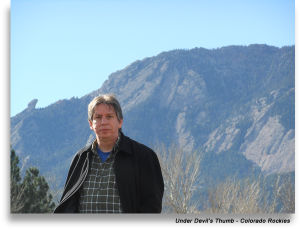
We lived for a year in Colorado. The access road to our housing complex presented a spectacular, expansive view of the Rockies. The mountains were my morning companions as I drove beside them into Denver. I thought at first that they stood as a silent reminder that some things cannot be corrupted. But, it now feels like stoical acquiescence. I will return to the mountains, they are like friends; but, the ocean is in my blood and I can’t be away too long.
In contrast, my grandfather, Robert Lowry Calhoun, wrote of how the mountains restored his faith when he found he had, “Doubt that there is any God, and that the world’s noise means anything.” Grandpa was nearly stone deaf; and yet, these rock colossuses spoke to him.
![]()
This new confidence was first prompted, unless memory at this point is all wrong, by two very hard facts: the invincibility of a clear-headed medical student dying of cancer, and the impassive bulk of the Rockies above timber line, which I saw for the first time four months later. To them was added almost at once the departure of another young doctor, my closest friend, for the Rockefeller yellow fever work in Africa, from which he did not return.
— Robert Lowry Calhoun, A Liberal Bandaged But Unbowed
![]()
These were his reflections in 1939 when he was asked by Charles Clayton Morrison to write an article in the series, “How My Mind Has Changed”, for the journal, The Christian Century. The decade of the 30s had been disruptive in his life culminating in the death of his brother and brother-in-law. But, (miraculously?), “After the first few months of chaos, a new foundation of confidence began to take shape in me, far below the word-level” resulting in his espousal of Christian Realism.